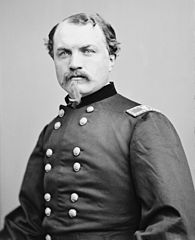Wherein Centreville is captured without very much blood
.........................................................................................................................................
 |
| William W. Averell |
Since March 9, the day after Lincoln's order assigning corps commanders to the Army of the Potomac, Maj. General George B. McClellan's army had been on the move, slowly at first, but gaining speed. Averell's Pennsylvanians had been at the front of that movement.
Company F, which had been part of the tangle with the North Carolina cavalry on the road to Hunter's Mill back in November, had a new captain on March 9, George Johnson, formerly second lieutenant of Company L. Averell had spent the winter as a holy terror to his officers, most of whom he found deficient, to either provoke them to improve their abilities or to drive them from the service. Johnson's predecessor had not passed the test, but the young second lieutenant had been impressive enough to win a double promotion.
The day of his promotion, Captain Johnson was put through the nerve-wracking ordeal of an inspection. Whether Johnson was beside himself or cool and collected, he was responsible not only for making sure all his men turned up in perfect uniform, but then performed the drills asked of them. The inspector was Brig. General Fitz John Porter, leader of one of McClellan's infantry divisions and a known protege of the general-in-chief. Fortunately, it went well:
The review and inspection ended, the officers were summoned in front of the Colonel's quarters. General Porter addressed the officers briefly, congratulated them upon the fine appearance of the troops, and gave utterance to his feelings in remarks of a most flattering character.
